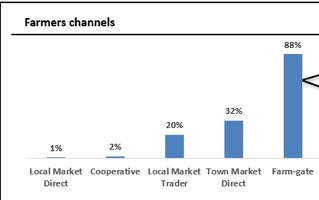A new report by the African Center for Economic Transformation (ACET) has shown that smallholder farmers in the country are increasingly facing challenges in reaching various markets to sell their products.
The report titled “Smallholder Farmer Voices in Policy Discourse” engaged 99 peasant farmers in eight regions across the country. The regions are Bono East, Ashanti, Western, Central , Eastern, Oti and Greater Accra.
The findings showed that a variety of issues including the advent of supermarkets, diet shifts, urbanization, market reforms, and street food– among others, serve as a barrier to these farmers in reaching the markets.
The report pointed out for example that the advent of supermarkets has created a system where smallholder farmers are excluded in the supply chain to these formal markets.
According to the report, smallholder farmers are unable to meet the various criteria of these formal markets such as consistency in supply and quality check.
In addition, the report indicated that the shift in diet of Ghanaians has resulted in many people boycotting foods produced by local farmers for imported foodstuff.
Presenting the details of the report through a virtual platform, an Economist with ACET, George Boateng lamented that the situation must be remedied to improve the livelihood of peasant farmers who rely on the sale of their produce to make an income.
“There is growing imports of food into the country. The World Bank recently reported that Ghana’s annual food import bill is above US$2 billion. This exceeds the amount of money we get from the export of cocoa. We import almost every food,” Mr. Boateng said adding that the development is negatively affecting smallholder farmers.
Apart from the bad road network that makes it difficult for peasant farmers to cart their goods from the farmgate to the market, Mr. Boateng indicated that most of these farmers are also exploited by middlemen who sign contracts with the farmers to help link them to major markets.
He maintained that even though contract farming is an innovative way of creating markets for poor farmers, it also opens them up to dubious people who quote unfair prices.
“Contracts are not working well in Ghana. This is due to abuse and exploitation of the weaker partner who is the farmers”, he said.
On the contrary, Mr. Boateng stated that Ghanaian farmers are market oriented and would want to use electronic channel to sell their produce if the processes are made less difficult and fair prices guaranteed.
The situation, Mr. Boateng said has led to a phenomenon where farmers prefer selling their produce at the farmgate.
He stated that majority of farmers do not also use the cooperative platforms to sell their produce due to low prices quoted for farmers and high prices quoted for traders.
Mr. Boateng disclosed that 52 percent of farmers relied on neighbours for critical information in selling their produce and setting prices.
By this, most of the farmers do not access any electronic platform in determining prices even though the Ghana Commodity Exchange is available to sell their produce.
Recommendations
Providing some solutions to improve market access, the report suggested that government can extend subsidized credit to larger farmers to acquire equipment and in return, provide mechanization services to smallholder farmers, which will be widely available and affordable.
The report also recommended a business model to increase access to mechanization such as Trotro Tractor.
On storage of foodstuff, the report stated that local assemblies can help smallholder farmers with silos built of mud and local grasses which are traditional in some parts of Ghana and can store up to 1.5 tons of grain, reducing losses to almost zero if the grains are dried well.
“Hermetic bags are cheap and very cost-effective for storing small quantities of produce. More advocacy is needed to diffuse the technology,” he said.
Touching on the exploitation of Middlemen Mr. Boateng was of the view that Electronic Warehouse Receipt System could be adopted as the farmers are educated on the importance and benefits of the Ghana Commodity Exchange.
He added that the local assemblies must be made to use Information Communication Technologies (namely, mobile phones and radios) in rural areas to provide critical information to farmers.










